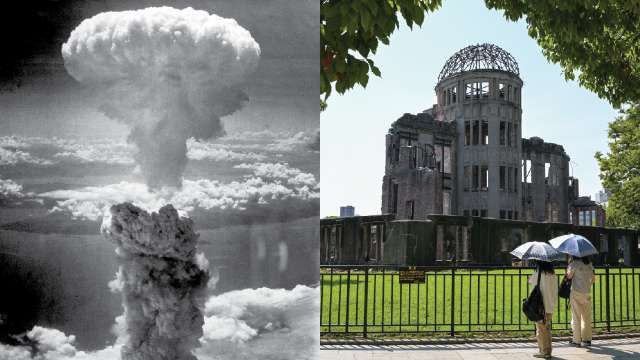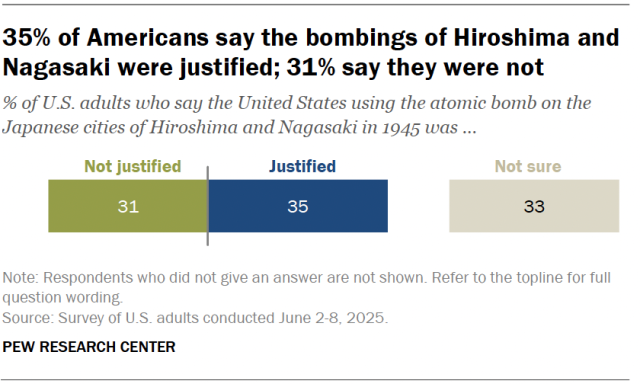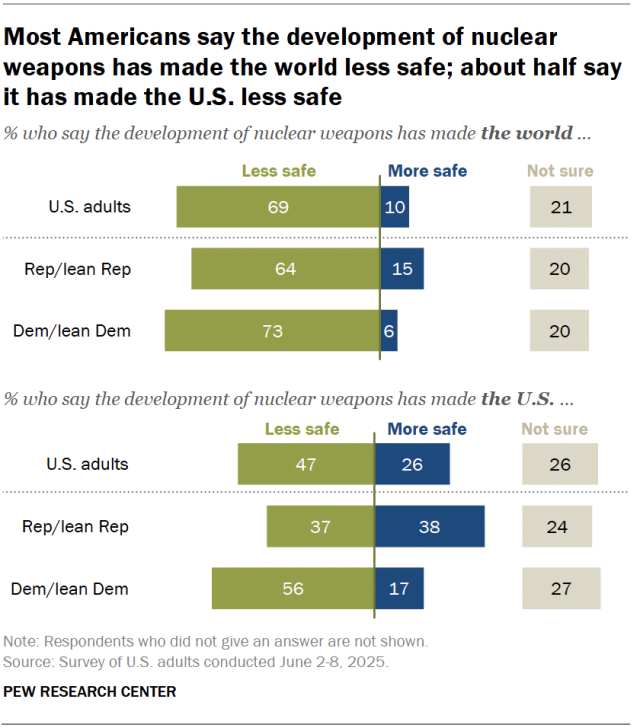
Aug. 6 marks the 80th anniversary of the United States dropping an atomic bomb on the Japanese city of Hiroshima – and three days later, on Nagasaki – during World War II. Today, most Americans (83%) say they know a lot or a little about these events, according to a new Pew Research Center survey conducted June 2-8, 2025.

Reflecting on the United States’ actions, 35% of Americans today say using the atomic bomb on Hiroshima and Nagasaki in 1945 was justified, while 31% say it was not justified. A third say they are not sure.
Estimated death tolls from the bombings range from roughly 100,000 to over 200,000 people. Many of these deaths were instantaneous, and still more died years later from the effects of radiation. The bombings hastened the end of WWII – with Japan surrendering a few days later – and accelerated the nuclear arms race.
Historical public opinion about the bombings of Hiroshima and Nagasaki
In 1945, immediately after the bombings, a Gallup poll conducted through face-to-face interviews found that the vast majority of Americans (85%) approved of the United States’ actions. Decades later in 1990, a Gallup phone poll found that 53% of Americans approved of using the atomic bomb on the two Japanese cities. Approval remained between 53% and 59% in four additional Gallup phone surveys fielded between 1991 and 2005.
In a 2015 Pew Research Center survey, also conducted on the phone, 56% of Americans said the use of the atomic bomb on Hiroshima and Nagasaki was justified, while 34% said it was not. Unlike in the new survey, the 2015 survey question did not include an explicit “Not sure” response option.
How views of the bombings differ by demographic group
While the U.S. public has mixed views today about the bombings of Hiroshima and Nagasaki, attitudes differ by gender, age, party and political ideology.

Gender
Men are more likely than women to say the bombings were justified (51% vs. 20%). Women are more likely than men to say the bombings were not justified (36% vs. 25%). Women are also about twice as likely as men to say they aren’t sure (43% vs. 22%).
Age
Americans ages 65 and older (48%) are more likely than adults in younger age groups to say the bombings were justified. Adults under 30, meanwhile, are considerably more likely to say the bombings were not justified than to say they were justified (44% vs. 27%).
While the atomic bombings are a direct memory for only a few of the oldest Americans today, older adults remain closer to the events and the collective memory of the bombings.
Party and ideology
About half of Republicans and independents who lean toward the Republican Party (51%) say the bombings were justified, but views differ considerably by ideology. Around six-in-ten conservative Republicans (61%) say the bombings were justified, while a much smaller share (14%) say they were not. Moderate and liberal Republicans, by contrast, are about equally likely to say the use of the bombs was justified as to say it was not justified (35% vs. 31%).
Democrats and Democratic leaners are more likely to say the bombings were not justified than to say they were justified (42% vs. 23%). Liberal Democrats are particularly likely to see the use of the atomic bomb as unjustified – 50% say this.
Has the development of nuclear weapons made us more or less safe?
Including the U.S., nine countries are believed to have nuclear weapons. Global stockpiles of nuclear weapons are projected to increase in the coming years, potentially reversing a yearslong trend of decline.

Today, most Americans (69%) say the development of nuclear weapons has made the world less safe. Far fewer (10%) say this has made the world safer, according to the Center’s new survey, which was fielded prior to U.S. and Israeli strikes on Iranian nuclear sites in June.
Majorities of both Democrats (73%) and Republicans (64%) say the development of nuclear weapons has made the world less safe.
When it comes to the safety of the U.S. specifically, Americans are also more likely to say the development of nuclear weapons has made the country less safe rather than safer (47% vs. 26%). But views are more mixed on this question.
Democrats are far more likely to say the development of nuclear weapons has made the U.S. less safe rather than safer (56% vs. 17%). Republicans are divided: 37% say the development of nuclear weapons has made the U.S. less safe, while 38% as say it has made the U.S. safer.
Note: Here are the questions used for this analysis, the topline and the survey methodology.
